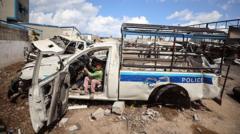As Netanyahu prepares for discussions with President Trump, the focus shifts from Iran to negotiations for peace in the region, emphasizing the complex dynamics of Middle Eastern politics.
**Netanyahu's Diplomatic Mission: Balancing Security and Ceasefire Talks**

**Netanyahu's Diplomatic Mission: Balancing Security and Ceasefire Talks**
Israeli Prime Minister Benjamin Netanyahu's visit to Washington aims to solidify U.S.-Israeli ties while addressing the ongoing conflict in Gaza.
In the wake of intensifying conflict in the Middle East, Israeli Prime Minister Benjamin Netanyahu will embark on a high-stakes trip to Washington this coming Monday for a critical meeting with U.S. President Donald Trump. This visit marks Netanyahu’s third since Trump's return to power, underscoring the importance of U.S.-Israel relations amidst recent military actions. Analysts suggest this meeting serves as a strategic move for Netanyahu, whose political future may hinge on the support and image bolstered by his relationship with the current U.S. administration.
The backdrop for this diplomatic endeavor is multifaceted. Following a joint Israeli-U.S. operation that targeted Iran's nuclear facilities, Netanyahu appears to be riding a wave of perceived success. However, official statements hint at a shift in focus; this meeting centers less on Iran and more prominently on creating a cease-fire in Gaza. The protracted conflict, which escalated dramatically after the Hamas-led assault on Israel on October 7, 2023, has returned to the forefront of international diplomacy.
In the lead-up to his visit, Israel has dispatched negotiators to Qatar in hopes of mediating discussions with Hamas, aiming to establish terms for the release of hostages and an eventual cessation of hostilities. Such efforts reflect the complexity of Middle Eastern geopolitics, where multiple players, including the U.S. and regional partners, strive for stability while addressing diverse interests.
Additionally, the U.S. is facilitating talks between Israel and Syria to maintain a tranquil boundary, further complicating the landscape. While seeking peace could provide a crucial advantage for Netanyahu in the upcoming elections, geopolitical dynamics ensure that any successful outcomes remain uncertain amid the ongoing turbulence within the region.
With an eye on both domestic politics and international relations, Netanyahu's diplomatic mission highlights the critical and often tangled threads woven through the fabric of Middle Eastern conflict resolution as leaders grapple with the challenges of security, peace, and humanitarian concerns.
The backdrop for this diplomatic endeavor is multifaceted. Following a joint Israeli-U.S. operation that targeted Iran's nuclear facilities, Netanyahu appears to be riding a wave of perceived success. However, official statements hint at a shift in focus; this meeting centers less on Iran and more prominently on creating a cease-fire in Gaza. The protracted conflict, which escalated dramatically after the Hamas-led assault on Israel on October 7, 2023, has returned to the forefront of international diplomacy.
In the lead-up to his visit, Israel has dispatched negotiators to Qatar in hopes of mediating discussions with Hamas, aiming to establish terms for the release of hostages and an eventual cessation of hostilities. Such efforts reflect the complexity of Middle Eastern geopolitics, where multiple players, including the U.S. and regional partners, strive for stability while addressing diverse interests.
Additionally, the U.S. is facilitating talks between Israel and Syria to maintain a tranquil boundary, further complicating the landscape. While seeking peace could provide a crucial advantage for Netanyahu in the upcoming elections, geopolitical dynamics ensure that any successful outcomes remain uncertain amid the ongoing turbulence within the region.
With an eye on both domestic politics and international relations, Netanyahu's diplomatic mission highlights the critical and often tangled threads woven through the fabric of Middle Eastern conflict resolution as leaders grapple with the challenges of security, peace, and humanitarian concerns.



















